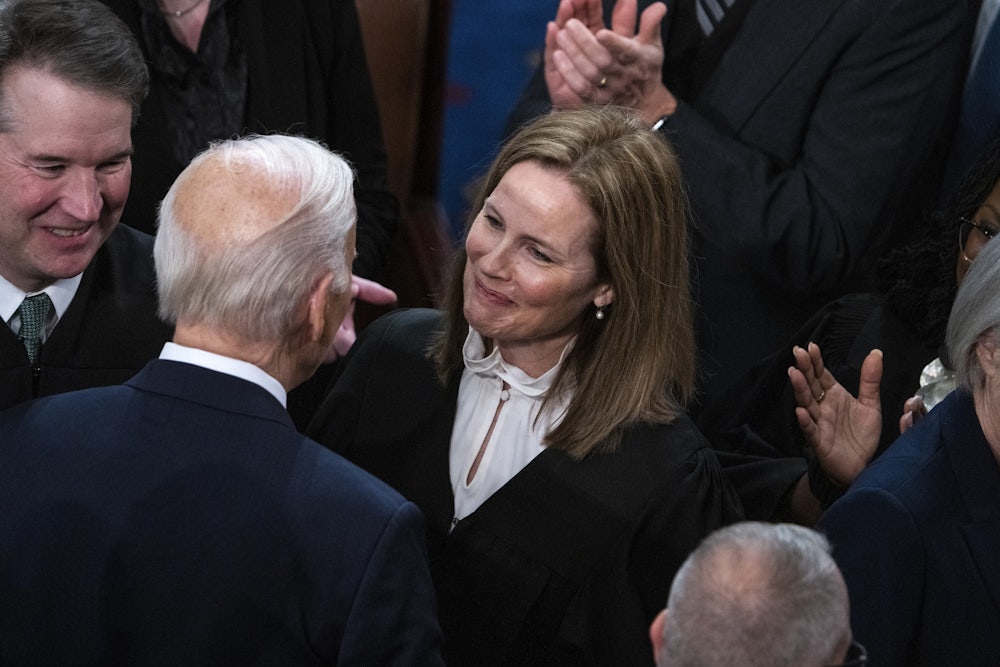Sometime this month, the Supreme Court is likely to overturn something known as the Chevron deference, which grants federal agencies the authority to interpret the laws that Congress passes. The ruling, depending on its scope, could knee-cap the federal government’s ability to do its job. That would be a windfall not just for big business generally but fossil fuel interests, in particular, who would like it to be harder for regulators to limit emissions from power plants, cars, and other polluting goods. These same oil and gas executives may get another gift on top of the Supreme Court’s Chevron ruling too.
As Dharna Noor reported for The Guardian recently, a who’s who of fossil fuel interests are now pushing SCOTUS to consider whether states can sue corporate polluters for climate damages—and, instead, rule that greenhouse gas emissions are a strictly federal matter. The case in question is Honolulu’s 2020 suit against several major oil companies, including Chevron and Shell. If SCOTUS were to side with the industry and throw out the case, courts might then also dismiss the cases of the 40 cities and states now bringing similar legal challenges against fossil fuel companies.
Leonard Leo, the conservative legal activist who’s helped mastermind the right’s takeover of the judicial system, including the Supreme Court, is one of the people behind this campaign. The oil giant Chevron has been a client of Leo’s P.R. firm, CRC Advisors.
The justices who could decide this case have a number of indirect links to the oil and gas industry. Chevron itself is a top donor to the Supreme Court Historical Society. The SCHS was in the news most recently as the venue in which Supreme Court Justices Samuel Alito, as well as Alito’s wife, spouted off to an undercover reporter about pride flags and Christian values. Perhaps its greater significance, though, is as a convenient way for donors to buy a friendly audience with some of the country’s most powerful people. A 2022 New York Times investigation revealed that the society acts as “a vehicle for those seeking access to nine of the most reclusive and powerful people in the nation” through its solicitation of high-value donors. Among other top contributors to the SCHS are several law firms that take on fossil fuel firms as clients in litigating cases, facilitating business transactions and even lobbying. Among those are Gibson Dunn and Paul Weiss, the firms whose lawyers are petitioning the Supreme Court to stop Honolulu’s case from moving forward, on behalf of the fossil fuel industry.
What about the justices themselves? Shell also has a linked petition pending before the Supreme Court to get Honolulu’s case thrown out. As has been well documented, Amy Coney Barrett’s father, Michael E. Coney, spent 29 years working as an attorney for Royal Dutch Shell and was involved, as well, with the American Petroleum Institute. It was during Coney’s tenure at Shell, when Coney Barrett was a teenager, that the company published an internal report on climate science acknowledging both the operational costs climate change could pose and the role of oil and gas in fueling rising temperatures; such reports—including early climate science reports by Exxon—have been scrutinized in governments’ suits against Shell, Exxon, and other oil and gas producers. After working for Shell, Coney went on to represent the company as a client at the law firm Carver Darden.
Coney Barrett even recused herself from cases involving Shell while working as a federal judge on the Seventh Circuit “out of an abundance of caution” given her father’s work for Shell, though she has never recused herself from cases related to either Shell or the oil and gas industry while serving on the Supreme Court.
The Supreme Court’s conservative majority hasn’t exactly been shy about its commitment to right-wing political causes or friendships with Republican billionaires. They’ve tended to act as the Republican Party’s voice in the judicial branch, ruling in line with the priorities of the Federalist Society and other right-wing legal institutions that have groomed them. The Republican Party, in turn, has in recent memory functioned as the political arm of the fossil fuel industry. In the coming weeks, no one should be surprised if the Supreme Court chooses to dramatically restrict cities’, states’, and federal regulators’ tools for dealing with the rapacious oil and gas industry. That’s precisely what this court system, with this particular selection of justices, was designed to do.








